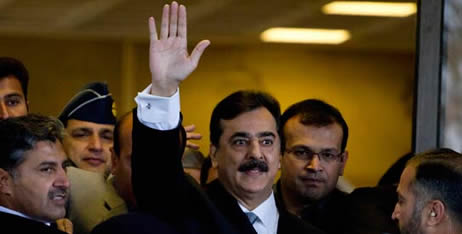The Supreme Court’s decision to formally indict the Prime Minister on charges of contempt on Monday revolves around the question of presidential immunity outlined in Article 248 of the constitution, and yet this important fact seems to have been all but ignored in the discussion of charges against the PM as the court and the media prefer to discussion whether or not the PM is disobeying the court’s order. Before a decision can be made on the wisdom of not writing the court’s desired letter, though, a thorough review of the Supreme Court’s order to write the letter must be undertaken.
When the government responded to the court’s order by explaining that Article 248 prevented them from pursuing cases against the president while he is in office, the first argument that the president’s opponents made was that he only enjoyed “qualified immunity” for actions taken in the course of his official duties. Article 248 seems pretty clear about granting the president absolute immunity, though – “No criminal proceedings whatsoever shall be instituted or continued against the President or a Governor in any court during his term of office.” Opponents then changed their argument to say that the constitution gives him immunity in Pakistan, but not in foreign courts. Of course, this is wrong, too. Article 248 says very plainly “in any court”, not “any Pakistani court”. This then moved the Chief Justice to make the bizarre claim that the president can’t claim immunity based on what the constitution says, that he has to come and beg His Lordship to grant it. Zardari haters then began claiming that Article 248 required “interpretation”.
Justice Ali Nawaz Chowhan, an International Judge of the United Nations at The Hague, Permanent Judge of the Lahore High Court, a visiting Professor and Co-Chairman of Unesco Appeal (Judicial) Board has explained that such a suggestion is prima facie silly – the language of the constitution is plain and does not require interpretation.
Despite the plain language of the constitution, the Chief Justice has ordered the Prime Minister to write a letter to the Swiss authorities requesting that corruption cases be opened against the president – an act that is clearly against the constitution. This puts the PM in a ‘damned if you do, damned if you don’t’ situation.
Rather than disobey the constitution, the PM is following the recommendation of his legal advisors and not writing the letter. For disobeying the Court’s order, he has been charged with contempt. The Prime Minister said that if he is convicted, he will follow the law and step down. Reportedly the government has already prepared for this scenario.
Not so fast.
Article 248 has been widely discussed as the reason why the PM can’t write the letter to the Swiss authorities, but what hasn’t been discussed is the issue of “qualified immunity” for the Prime Minister himself.
Section 1 of Article 248 says:
The President, a Governor, the Prime Minister, a Federal Minister, a Minister of State, the Chief Minister and a Provincial Minister shall not he answerable to any court for the exercise of powers and performance of functions of their respective offices or for any act done or purported to be done in the exercise of those powers and performance of those functions
It names the Prime Minister specifically, and grants him qualified immunity for acts and performance of his office. This is not the same as the complete immunity granted to the president in Sections 2, 3, and 4 – it is the normal immunity granted to government officials that allows them to do their jobs without having the second-guess every act they take. What does that have to do with this case?
If the Supreme Court decides to punish the Prime Minister for not carrying out an order that the law ministry advised was unconstitutional, they will be in violation of Section 1 of Article 248. More worrisome, the court will be setting a dangerous precedent – no longer will government officials be able to rely on the plain language of the law nor the advice of their legal counsel. Every decision taken will have to first be cleared by the Supreme Court, otherwise the officials will never know if any action will result in them being hauled to dock and packed off to jail. That’s not what is supposed to happen in a court of law, that’s what happens in a royal court.
![]()






